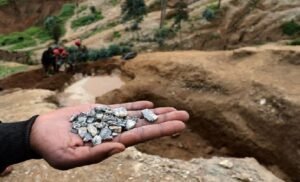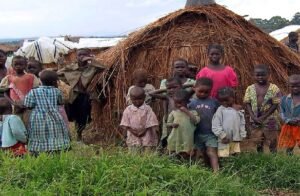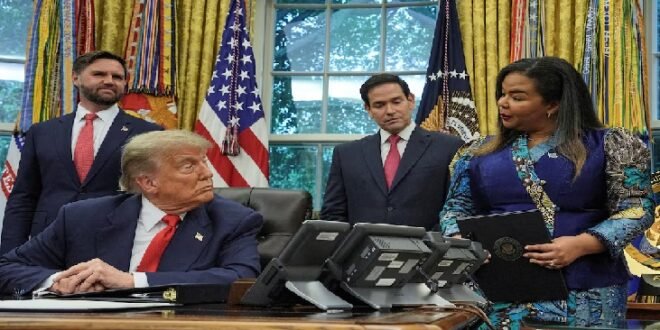14-07-2025
DAKAR: An Israeli-American businessman, a former State Department official and a decorated Green Beret pitched up in the Democratic Republic of Congo in March with a message for President Felix Tshisekedi from the Trump administration.
 Two days later, they fled the country in fear of arrest.
Two days later, they fled the country in fear of arrest.
The three envoys had come with an offer from Washington: release three American prisoners on death row and, in return, President Donald Trump will accept your minerals-for-security proposal.
The trip started well with a police motorcycle escort from the airport, but a frosty first meeting with Tshisekedi’s security adviser, some ill-advised late-night target practice by some of the envoys and a Congolese general with an axe to grind put paid to the mission.
Media pieced together the course of events by speaking to the three Americans on the trip, a State Department official involved in the initiative and two people the trio met during their brief stay in Congo’s capital Kinshasa.
The story of the ill-fated venture, which has not previously been reported, provides a glimpse of how the Trump administration is prepared to work through unconventional channels in pursuit of deals to bring Americans home, a top priority for the president.
“We want to work with folks who have the right connections, but more importantly, have the positive relationships that can help influence a decision-maker’s thinking … so it’s not uncommon for us to do that,” Dustin Stewart, Trump’s deputy special envoy for hostage affairs, who was involved in discussions on the initiative, told media.
“We thought they had enough sway to talk to the right people. Obviously, that proved incorrect,” he said.
President Tshisekedi’s office did not respond to requests for comment for this article.
Congo has become a focus of US diplomatic efforts to end the decades-long conflict in the east and help American companies’ access critical minerals, making the country ripe territory for endeavors such as this mission.
 “Trump gave every indication right from the beginning that he was going to be purely transactional,” said Ebenezer Obadare, a senior fellow at the Council on Foreign Relations. “He’s thrown out the old playbook. He’s not going through normal diplomatic channels.”
“Trump gave every indication right from the beginning that he was going to be purely transactional,” said Ebenezer Obadare, a senior fellow at the Council on Foreign Relations. “He’s thrown out the old playbook. He’s not going through normal diplomatic channels.”
It all started in January this year when Israeli-American businessman Moti Kahana met the Congolese president on the sidelines of the World Economic Forum in Davos to warn him about a coup plot purportedly involving Israelis.
Kahana handed over the names of the alleged plotters to Tshisekedi in an envelope, according to the businessman and two other people involved. Media could not determine whether the alleged plot was real.
Kahana told media he was aware that Washington had a number of live interests in Congo, and after returning from Davos he decided to try to arrange another meeting with Tshisekedi.
Three Americans had been sentenced to death by a Congolese military court in September 2024 for participating in a separate, failed coup in May last year. Efforts to free them by the Biden government and the Trump administration had gained little traction.
At the same time, negotiations were intensifying over a deal in which the United States would secure greater access to Congo’s minerals in return for help defending the country from Rwanda-backed insurgents rampaging across its eastern provinces.
To get the ball rolling, Kahana met with State Department officials in Washington in March. (Int’l News Desk)
 Pressmediaofindia
Pressmediaofindia




